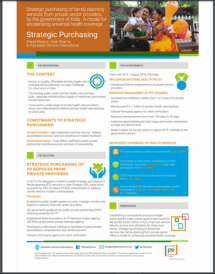Strategic Purchasing of Family Planning Services from Private Sector Providers by the Government of India: A Model of Accelerating Universal Health Coverage
This poster focuses on increasing access to quality family planning services to urban poor through the strategic purchase of FP services through private providers.
The overall approach was to enable the public system to own, manage, monitor and finance the accredited private providers to deliver equitable access to family planning services. Population Services International (PSI) developed a single window, web-based interface to facilitate private provider accreditation, empanelment, and reimbursement by the government to the individual private provider in the network.
Overall, it resulted in policy shifts – the first time introduction of life time empanelment of private providers by the government, increased accreditation validity from 1 to 5 years for private clinics, and established a centralized payment disbursement mechanism from the earlier system of district level payments. It improved efficiencies of the management of the public private partnerships scheme and achieved scale, coverage and impact.
Source: Population Services International
Date of Publication: March 25, 2019
SIMILIAR RESOURCES
Tools
Examples
- Transforming the Private Sector to Support Universal Malaria Diagnostic Coverage
- How Businesses Can Invest in Women and Realize Returns
- Social Franchising: Improving Quality and Expanding Contraceptive Choice in the Private Sector
- CDC’s Guiding Principles for Public-Private Partnerships: A Tool to Support Engagement to Achieve Public Health Goals
- Engaging the Private Sector in Maternal and Neonatal Health in Low and Middle Income Countries
- All You Need to Know about Spurious Medicines in India: A Guidebook
- Opportunities for Postpartum Family Planning in the Private Sector
- Promoting Quality Malaria Medicines Through SBCC: An Implementation Kit
- How to Improve Access to Malaria Treatment in the Private Sector [Webinar]
- Lessons Learned from an Integrated Approach for Reaching First-time Young Parents in Nigeria

